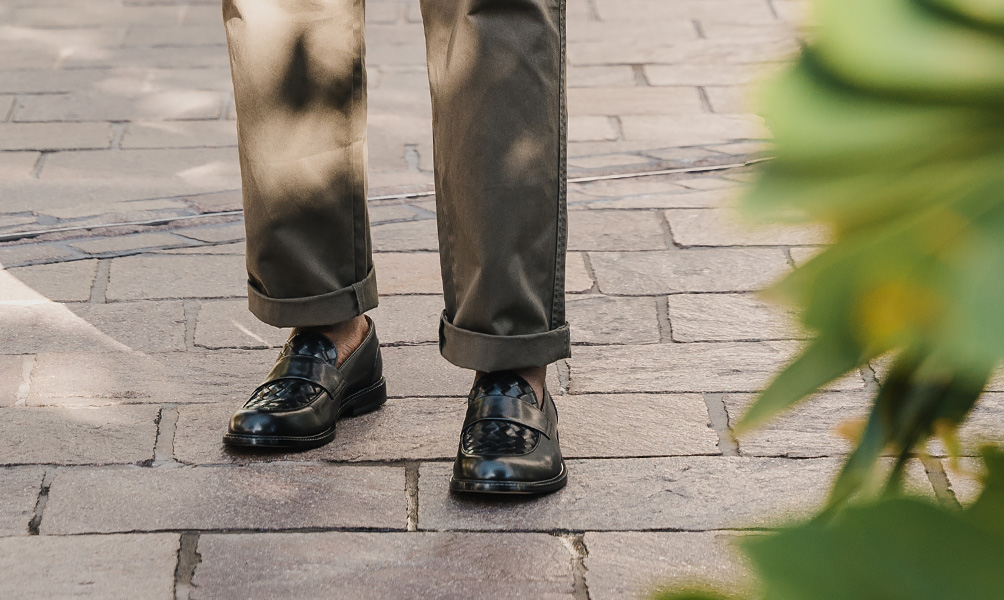24 Apr 2023
The Importance of High Quality Luxury Shoes
Here’s the big question when it comes to shoes: are you getting what you pay for? Does more money equal better quality? And why spend hundreds of dollars on a good pair of shoes, when you can buy several pairs of cheap, terrible shoes for the same price? This is the value proposition when it comes to high-quality luxury shoes, or really high quality luxury anything. At the end of the day, is it worth it?
We’re slightly biased, obviously, but when it comes to shoes, we think the answer is a resounding ‘Yes’. It does matter what you wear on your feet, for several reasons. Some of them obvious and tangible (posture, blisters etc.), and some of them less so (how a pair of shoes can make you feel).
So, what makes a shoe ‘luxurious’, and why do we need them? Let’s dive right in.
What makes a high-quality leather shoe?
This comes down to three factors: design, materials and construction. Design is the most subjective of these, but basically a high-quality shoe will look like a high-quality shoe. When you hold quality in your hand, it tends to feel different. Keep an eye out for original designs and attention to detail, too.
Materials and construction are much more concrete. Luxury men’s shoes should be made of leather uppers, rather than synthetic (you can check the product description if you’re unsure, or ask in-store). Quality leather for men's shoes are manufactured with a variety of different treatments, finishes and techniques, our 'Premium Leather' D'ORO styles will range from a dip dyed and tumbled buttery soft leather like the Osbourne 2.0, to a sturdier upper with a bold finish like our Dylan. Soles can be leather or rubber, depending on the shoe and its purpose. Quality dress shoes should also feature leather lining.
When it comes to construction, you’re going to find a lot of jargon in the shoe world. moccasin construction, Sachetto construction, Blake-stitched soles, cement construction (literally gluing the sole and upper together). You don’t need to be an expert on all these terms. The main thing to keep in mind is that poor quality shoes usually won’t feature any special kind of construction. ‘Cement’ tends to be standard at lower prices points, but this isn’t necessarily an indication of quality. We use cement construction on several of our boots, for example.
Quality is an amalgamation of all these things. Good design, great materials, and solid construction. Like a lot of things in life, you know it when you see it.
Why are quality shoes important?
Your shoes are your connection point to the ground. Considering we walk around in them every day, in all sorts of conditions, they play a crucial role in our day-to-day wellbeing. Here are just a few reasons why it pays to invest in quality shoes:
Posture
When you consider all the complex biomechanics that go into every single step you take, getting the right fit, and the right shoe, is crucial. Studies have shown that quality shoes literally improve your posture. They’re more comfortable, more supportive, and better molded to your feet. Ever noticed how cheap, flat sneakers make your feet ache after a long day? That’s because they offer no arch support, no heel support, no structure to brace against. They work against your feet, rather than with them.
Confidence
Anyone who’s stepped out in a new pair of leather shoes knows the feeling. Footwear affects how you feel. This is true of any luxury fashion choice: new briefcase, new suit, new belt. Luxury footwear is technically an accessory, albeit a very practical one, and it impacts your overall confidence. Just think about how different shoes can change your mood: a pair of sneakers makes you feel sporty, fun, ready for anything; dress shoes are sharp, suave, put together; military boots are adventurous and bold. Quality has a way of simply making us feel good, and that’s always a worthy investment.
Longevity
This is one of the slam dunk arguments against buying cheap shoes. They’re paradoxically more expensive. This is known as ‘Boot Theory’ (after a famous Terry Pratchett quote) and has been embraced by economists as a serious thing. It basically boils down to: by trying to save money, and buy cheap boots, you actually spend more over the long term, given that a pair of luxury leather boots (if looked after with care) can last 10 years or more.
Instead of chucking out your cheap, worn shoes every year, try buying one pair of high-quality shoes and caring for them instead. It’ll save you money, and help the environment too.
Style
Style is obviously incredibly subjective, but high-quality leather shoes (as a rule) look much better than the alternative. They reflect your personal sophistication. Your elegance. Your attention to detail. Nothing lets down a good outfit like a bad pair of shoes; they have a way of drawing people’s eyes downwards, and not in a good way. If you want to stand out and make an impression, starting with some good quality shoes is probably the best way to do it. We have a saying: build your outfit from the ground up. Start with good shoes, and slowly build a wardrobe to match.
Tips and tricks
Here are a few things to watch out for when it comes to luxury leather shoes:
- If it’s too good to be true, it probably is. Found some ‘high quality leather shoes’ for a quarter of the price? They’re probably not the genuine article. Still, you can shop smart. Buy from reputable dealers, and keep an eye out for seasonal sales like Christmas and Black Friday.
- Who cares wins. If you ignore your leather shoes and treat them like cheap sneakers, they will eventually break down and die. It’ll take longer, but it will happen. This means you need to be ready to care for your leather shoes long-term; kind of like a pet. We’ve written a comprehensive shoe care guide over here.
- Stay away from synthetic. Synthetic leather is not real leather (obviously). It feels cheap and looks cheap and it won’t last nearly as long. If possible, stick to ‘genuine leather’ and above.
- Get into construction. The more you learn about shoes, and how they’re made, the better informed you’ll be when it comes time to buy some. But don’t get too hung up on construction. As we’ve said earlier, cement construction (while the most accessible) isn’t always a bad thing. The red flag would be cement construction with poor quality materials: that’s the sign of a dodgy shoe.

.png.png?timestamp=2026-03-05T00:00:00+00:00)
